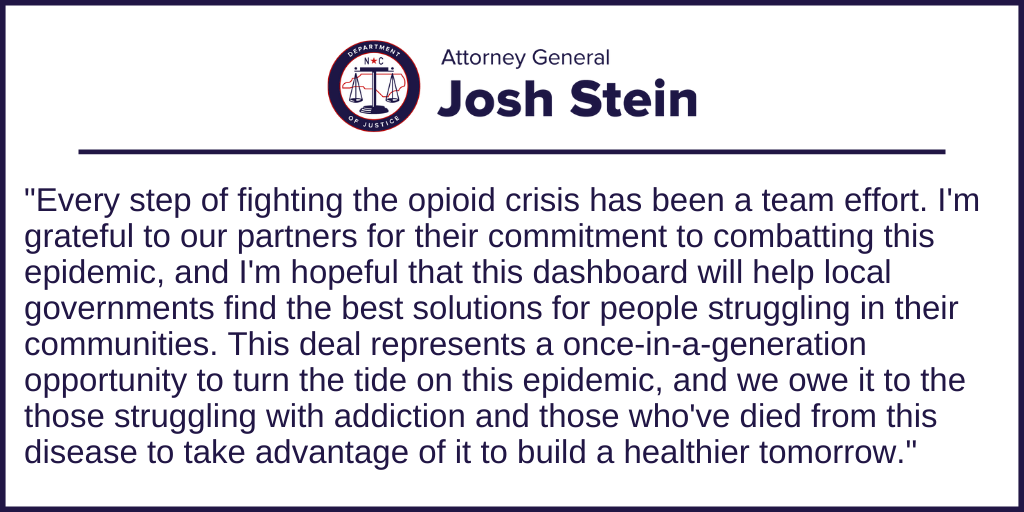
For Immediate Release:
Tuesday, November 9, 2021
Contact:
Nazneen Ahmed (919) 716-0060
(RALEIGH) Attorney General Josh Stein and state and local partners today unveiled a new online dashboard to help local governments in North Carolina fight the opioid crisis in their communities. The dashboard is available at https://ncopioidsettlement.org/ and offers resources to help communities decide the best ways to use their share of the nearly $850 million that could come to North Carolina to combat the opioid crisis.
“Every step of fighting the opioid crisis has been a team effort,” said Attorney General Josh Stein. “I’m grateful to our partners for their commitment to combatting this epidemic, and I’m hopeful that this dashboard will help local governments find the best solutions for people struggling in their communities. This deal represents a once-in-a-generation opportunity to turn the tide on this epidemic, and we owe it to those struggling with addiction and those who’ve died from this disease to take advantage of it to build a healthier tomorrow.”
The website and online resources were developed in partnership with the North Carolina Department of Justice, the North Carolina Department of Health and Human Services (NCDHHS), the UNC Injury Prevention Research Center (IPRC), the North Carolina Association of County Commissioners (NCACC), and the North Carolina League of Municipalities (NCLM). The Duke Energy Foundation provided financial support.
“This settlement and the funds from the settlement will be transformational for the counties and local governments in North Carolina,” said NCACC Executive Director Kevin Leonard. “It is going to make a difference in the lives of those who are suffering from impacts of this opioid crisis. This online resource will be an amazing new tool to share best practices, innovative treatments, and other resources across all of our 100 counties.”
“Dedicated public officials from across the state have been working to address the opioid crisis,” said NCLM Interim Executive Director Rose Vaughn Williams. “These settlement funds and the information tools created by the state Department of Justice will provide the resources necessary for communities to address this crisis in a comprehensive way. Opioid addiction has negatively affected so many lives, and the efforts that will come from this settlement offer hope that working together, we can create a better future.”
“The funding from these settlements help make possible the long-term investments individuals and communities need to build towards lasting recovery,” said NCDHHS Chief Deputy Secretary for Health Kody H. Kinsley. “The settlement aligns with the NC Opioid and Substance Use Action Plan — strategies that we know work to prevent addiction, reduce harm, and connect individuals in need to care and recovery supports that achieve employment and rebuild lives.”
“This is a partnership between communities, the university, and justice and health state agencies,” said Natalie Blackburn, PhD, a public health scientist at IPRC and project lead. “It’s very exciting to get the site launched. I look forward to adding more dashboards to the site in the coming months to help counties make decisions that are best for their communities.”
“All across the state, local leaders consider the opioid crisis to be one of the greatest challenges facing their communities,” said Stephen De May, Duke Energy’s North Carolina president. “The Duke Energy Foundation is proud to fund this powerful tracking tool and help North Carolinians in this fight.”
The funds to local governments will come from a $26 billion agreement Attorney General Stein helped negotiate with the nation’s three major pharmaceutical distributors – Cardinal, McKesson, and AmerisourceBergen – and Johnson & Johnson over the companies’ role in creating and fueling the nationwide opioid crisis. The agreements are moving forward and are currently in the subdivision sign-on period, which will run until Jan. 2, 2022. Additional funds will come from the resolution of the Purdue Pharma bankruptcy and the Mallinckrodt bankruptcy.
More than 120 local governments have already signed on to a Memorandum of Agreement detailing how North Carolina’s recoveries will be allocated and used. North Carolina counties and municipalities will need to sign onto the national settlement agreement by Jan. 2 to ensure that North Carolina receives its full share of the funds. Eighty-five percent of these funds will go directly to local communities, where they can put in place evidence-based treatment and recovery services to help people struggling with substance use disorders.
Once the agreements are finalized and settlement funds become available, the dashboard will also include annual financial and impact reports showing how local governments are using opioid settlement funds to address the epidemic. This transparency will ensure that the people of North Carolina will know and can evaluate the decisions made by their local leaders.
Additional information about the opioid settlements is available at https://www.morepowerfulnc.org/opioid-settlements/.
###
